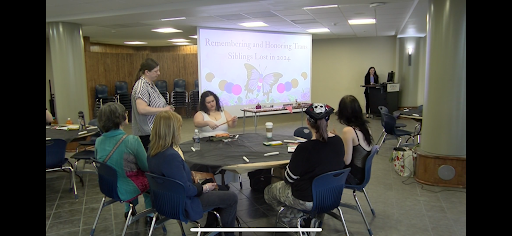James McClendon, Editor-in-Chief
College students have become more conscious of the negative impact cigarette smoke has on the body and how second-hand smoke can be just as damaging as first-hand.
The media has been flooded with content that warn the public about the dangers of smoking. Whether it’s a commercial that shows a young girl paying for her pack with a piece of skin from her face or another where an activist group leaves 1,200 body bags outside of a tobacco company’s office to demonstrate how many people die from their product every day, the message is clear.
According to Utica College’s current policy, no smoking is permitted inside any building, however, there are smoker’s stations set up outside of most of the buildings.
Senior Tyler Day can be found between classes having a cigarette at the smoker’s station outside of Hubbard Hall.
“I understand that people don’t want to be around smoking,” Day said. “I sit out here in the designated areas with my buddies and people snicker and make rude comments as they walk by. That’s not your place to do that.”
Freshman Johnathan Perrotta is a non-smoker and feels that there would be positives and negatives to UC becoming 100 percent smoke-free.
“For a lot of people smoking is an addiction, so they are just going to have to walk farther to smoke,” Perrotta said. “However, people who don’t smoke would love it because they can avoid the second-hand smoke.”
According to no-smoke. org, approximately 1,713 campuses across the United States became100 percent smoke free as of Oct. 1, 2016.
The 2016 report conducted by the non-profit organization Americans for Nonsmokers’ Rights highlighted how much the number increased over the past six years. In 2010, only 446 campuses were smoke-free and in 2011 that number increased to 586 campuses.
On Aug. 15, 2016, Mohawk Valley Community College added to this number by becoming a tabacco-free campus, which includes all tobacco products even if they are smokeless.
According to Mohawk Valley Community College sophomore Destinee Geffrard, the new policy has its positives and negatives.
“It makes the environment safer,” Geffrard said. “It also creates a problem because smokers have to move to off-campus areas and when you are trying to exit campus the street is crowded with smokers.”
Director of Environment and Health Conservation Robert Cross talked about where UC stands on the issue of becoming a 100 percent smoke-free campus.
“It has not really come up as a big issue yet,” Cross said. “UC going smokeless would require discussion and decision at the top leadership level.”
As more colleges and universities join the movement to become tobacco-free, it becomes clear that UC will eventually follow the trend.
“The idea of having all campuses ban smoking, especially here at UC, I see it happening unfortunately,” Day said.


















![President Todd Pfannestiel poses with Jeremy Thurston chairperson Board of Trustees [left] and former chairperson Robert Brvenik [right] after accepting the university's institutional charter.](https://uticatangerine.com/wp-content/uploads/2023/10/unnamed.jpeg)



















































































































